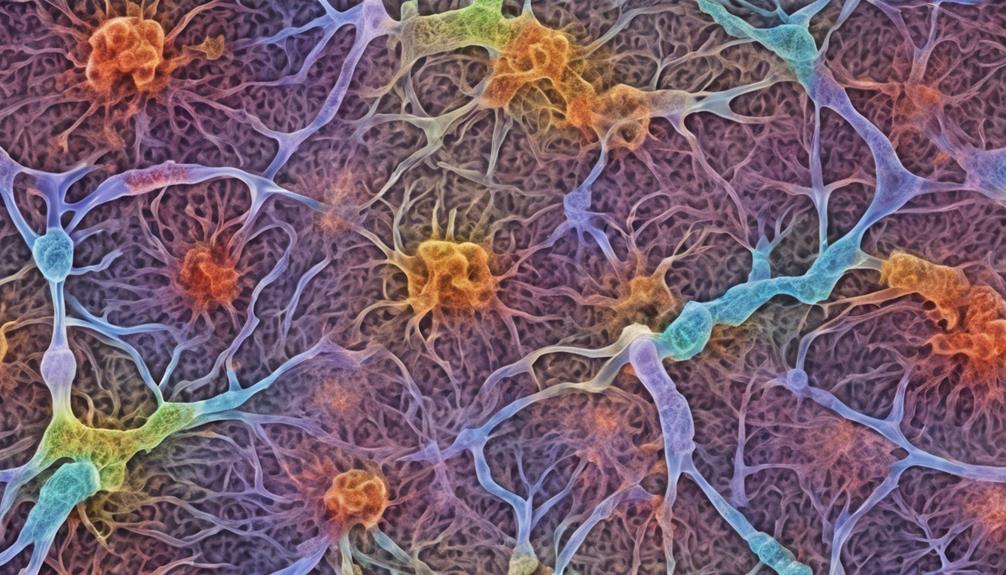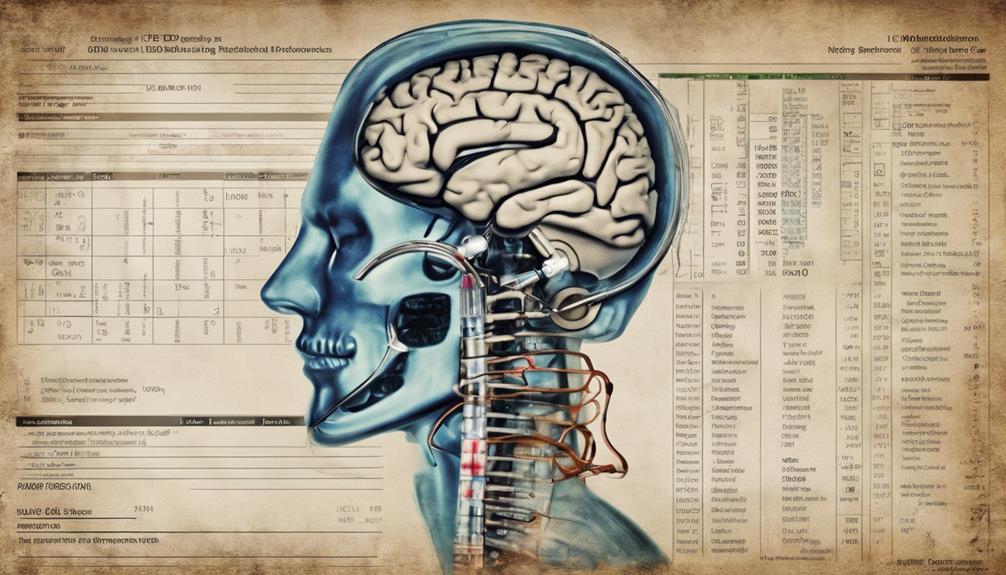In psychology, the common saying is to “know yourself.”
When exploring the intriguing intersection of dementia and narcissism, we uncover a complex interplay that raises thought-provoking questions about identity and adaptation in the face of cognitive decline.
The ways in which narcissistic traits manifest in individuals grappling with dementia present a unique set of challenges that demand a deeper understanding and nuanced approach.
As we navigate this intricate terrain, we are compelled to unravel the complexities that lie at the core of these intersecting conditions, shedding light on a lesser-explored aspect of mental health.
Key Takeaways
- Narcissistic traits increase dementia risk.
- Caregivers need boundaries and support.
- Dementia challenges narcissistic grandiosity.
- Therapy and resources aid caregivers.
The Link Between Dementia and Narcissism
Research findings have indicated a significant correlation between pathological narcissism and an increased susceptibility to developing Alzheimer's disease. Studies have highlighted that patients with personality disorders, including narcissistic personality disorder, may face a higher risk of neurodegenerative diseases like dementia. Individuals exhibiting narcissistic traits, particularly vulnerable narcissism, show a clear association with dementia risk.
Neurobiological vulnerabilities linked to narcissism could contribute to cognitive decline and increase susceptibility to Alzheimer's disease. Furthermore, personality changes commonly observed in individuals with narcissistic traits may serve as early indicators of cognitive impairment and dementia onset. Lifestyle factors combined with narcissistic characteristics play a role in the manifestation of dementia symptoms.
Understanding the relationship between narcissistic personality traits and dementia risk is crucial for early detection and tailored interventions for individuals at higher risk. By recognizing narcissism as a potential risk factor for neurodegenerative diseases like Alzheimer's, healthcare professionals can provide more targeted care and support for affected individuals.
Understanding Narcissistic Traits in Dementia Patients

Understanding the intricacies of narcissistic traits in individuals diagnosed with dementia sheds light on the complex interplay between personality characteristics and cognitive decline. Dementia can challenge narcissistic grandiosity, causing distress and vulnerability in those with narcissistic traits. Gaslighting, a manipulative tactic, may be utilized by narcissists to conceal dementia symptoms, leading to confusion and strained caregiving relationships. Studies indicate a correlation between pathological narcissism and an elevated risk of developing Alzheimer's disease. Furthermore, vulnerable narcissism traits have been linked to a higher likelihood of Alzheimer's disease progression. Lifestyle factors, in conjunction with narcissistic vulnerabilities, could play a role in the onset and advancement of dementia in individuals with narcissistic traits. This interaction between narcissistic tendencies and dementia in patients highlights the importance of a comprehensive understanding of the psychological aspects impacting their care.
| Narcissistic Traits in Dementia Patients |
|---|
| Grandiosity |
| Gaslighting |
| Vulnerability |
Coping Strategies for Caregivers of Narcissistic Dementia Patients
Navigating the complexities of caregiving for narcissistic dementia patients requires caregivers to develop robust coping strategies to effectively manage the unique challenges they may encounter. When caring for individuals with narcissistic dementia, caregivers often face manipulation, extreme demands, and guilt reliance, making it essential to prioritize mental health and well-being.
To cope with these challenges, caregivers should consider the following strategies:
- Setting Boundaries: Establishing and enforcing clear boundaries is crucial in managing the challenging behaviors exhibited by narcissistic dementia patients.
- Seeking Support: Joining support groups or seeking therapy can provide caregivers with the necessary guidance and emotional support to navigate their caregiving role effectively.
- Practicing Self-Care: Prioritizing self-care through adequate sleep, exercise, nutrition, and relaxation is vital in maintaining the well-being of caregivers.
- Mindful Communication: Engaging in mindful communication techniques can help caregivers effectively interact with narcissistic dementia patients and manage difficult situations with compassion and understanding.
Challenges of Managing Narcissism and Dementia Together

Managing the coexistence of narcissism and dementia poses significant challenges due to the inherent clash between grandiosity and cognitive decline. When caring for individuals with narcissistic personality traits facing dementia, the emotional turmoil that arises can be intense. Dementia has the potential to strip away the facade of grandiosity, revealing vulnerabilities and the true self of the individual. This unmasking process can lead to denial and increased emotional distress, complicating the care they require.
Narcissistic tendencies such as manipulation, aggression, and blame-shifting can further exacerbate the challenges of caregiving. Caregivers may find themselves navigating through a maze of complex behaviors, including withdrawal and outbursts. The progression of dementia in individuals with narcissistic traits unveils intricate dynamics that demand a delicate balance of empathy and firm boundaries.
In this intricate dance of caring for someone with a narcissistic personality disorder and dementia, the caregiver must be prepared to handle the unique obstacles that arise, from managing denial to addressing manipulation and aggression with compassion and professionalism.
Seeking Support for Dealing With Dementia and Narcissism
The complexities of caring for individuals with both dementia and narcissistic traits necessitate seeking support from various resources to navigate the emotional and practical challenges effectively. When dealing with dementia and narcissism, caregivers can benefit from a range of support options:
- Support groups: These provide emotional assistance and coping strategies tailored to caregivers facing the unique challenges of dementia and narcissism.
- Online resources: Forums and platforms offer a sense of community, allowing caregivers to share experiences, seek advice, and find solace in solidarity.
- Therapy sessions: Working with mental health professionals can equip caregivers with tools to navigate the complexities of caregiving in such challenging circumstances.
- Hotlines: Dedicated hotlines offer immediate guidance, resources, and a listening ear during difficult moments, providing much-needed support in times of crisis.
Utilizing these resources, caregivers can better understand the interplay between dementia and narcissism, develop effective communication strategies, and implement coping mechanisms to support both themselves and their loved ones.
Frequently Asked Questions
What Is the One Question to Identify a Narcissist?
One key question to identify a narcissist is, 'Do you have a grandiose sense of self-importance?' This inquiry helps gauge if an individual exhibits traits of narcissism, such as an inflated self-view, a constant need for admiration, lack of empathy, and a sense of entitlement.
Recognizing these traits early on can aid in understanding and effectively managing relationships with individuals displaying narcissistic behaviors.
What Does an Aging Narcissist Look Like?
As we age, a narcissist may exhibit amplified self-centered behaviors, resist medical care, and struggle with loss of independence. They may resist acknowledging cognitive decline and react with extreme rage to health diagnoses. Blaming others, isolating themselves, and displaying delusional thinking could be common.
Alzheimer's progression can strip away narcissistic facades, revealing the true self. It's crucial to approach aging narcissists with empathy and understanding to navigate their complex emotional landscape.
What Is the Root of Narcissism?
When examining the root of narcissism, we find that early childhood experiences and environmental influences play pivotal roles. Genetic predispositions intertwined with upbringing shape one's narcissistic tendencies.
Insecure attachment styles and emotional validation deficits can foster narcissistic traits as coping mechanisms for underlying vulnerabilities. Psychodynamic theories further suggest that unresolved conflicts during the individuation process contribute to the development of narcissism.
These factors collectively form the foundation of narcissistic behaviors.
What Does Living With a Narcissist Do to a Person?
Living with a narcissist can deeply impact our mental health and well-being. It can lead to emotional manipulation, gaslighting, and a profound feeling of worthlessness.
The constant exposure to their behavior can create anxiety, depression, and a sense of walking on eggshells. Our identity and autonomy may be compromised as their needs take precedence.
Long-term exposure can result in emotional trauma and challenges in forming healthy relationships in the future.
Conclusion
In conclusion, navigating the intersection of dementia and narcissism requires a delicate balance of understanding, patience, and support. Like a complex puzzle, caregivers must piece together the unique challenges presented by these conditions to provide effective care.
By acknowledging the impact on self-image and coping mechanisms, caregivers can help individuals with narcissistic traits maintain their identity and dignity as they face cognitive decline. Seeking support and guidance is key to successfully managing this intricate puzzle of dementia and narcissism.









